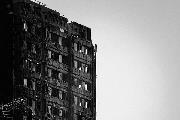Landlords of buildings with ACM panels with polyethylene filler and foam insulation are being urged to take action and remove the cladding

A type of cladding and insulation used in more than 80 tower blocks across England has failed safety tests and represents a “significant fire hazard”, the government has revealed.
The warning has been prompted by results of a new fire safety test released today of a type of cladding - ACM panels with polyethylene filler and foam insulation - used in scores of buildings across the country
“This wall system failed the test, which means it did not adequately resist the spread of fire over the wall to the standard required by the current Building Regulations guidance, and which is referred to in BR135,” according to new advice issued by the Department for Communities and Local Government (DCLG).
“The Expert Panel’s advice is that, based on the test results, they do not believe any combination of these materials (ACM with unmodified polyethylene filler and foam insulation) would meet current Building Regulations guidance…This combination of materials therefore presents a significant fire hazard on buildings over 18m,” it added.
The test results revealed that in the event of a fire, it would take just 6½ minutes for the outside of the cladding to reach temperatures of more than 800 degrees Celsius.
The test had to be stopped due to flames “several metres” above the top of the model used for testing, according to the BRE report. The cladding system was given a category 3 rating, which means it “has no flame retardant properties.”
Landlords of such buildings are being urged to take remedial action and remove cladding.
The DCLG said that “82 buildings are currently known to have this combination of materials in their wall cladding systems - 47 of which are local authority or housing association owned or managed.”
The new tests have been commissioned by the government and conducted by the BRE amid mounting fears over fire safety for thousands of people living in high rise flats across the country.
The test was more stringent than the first checks done after the Grenfell Tower fire, which only looked at the core of cladding panels with the aluminium outer skins removed.
Each test involves building a nine-metre-high demonstration wall with a complete cladding system including cladding panels, insulation and cavity barriers. This is then subjected to a replica of a severe fire inside a flat as it spreads out of a window, to see whether it meets the requirement to resist vertical fire spread.
Some three different types of ACM cladding are being combined with two different types of insulation to test their combustibility when taken together – meaning that six combinations are being tested in total.
At least 80 people died in the Grenfell Tower blaze in Kensington, London, in June. It emerged last night that Kensington and Chelsea Council and Kensington and Chelsea Tenant Management Organisation could face corporate manslaughter charges over the fire.
In a letter to residents, the Metropolitan Police claimed it has “reasonable grounds” to suspect that corporate manslaughter offences may have been committed by the two organisations, according to BBC reports.
The letter from the Met stated: “We have seized a huge amount of material and taken a large number of witness statements. After an initial assessment of that information, the officer leading the investigation has today notified Royal Borough of Kensington and Chelsea and the Kensington and Chelsea Tenant Management Organisation that there are reasonable grounds to suspect that each organisation may have committed the offence of corporate manslaughter under the Corporate Manslaughter and Corporate Homicide Act 2007.”
While campaigners welcomed the latest development, they want the police to go further and charge individuals with gross negligence manslaughter. In a statement yesterday, the Justice4Grenfell group said: “It’s not a case of either one or the other for justice to be done and to be seen to be done, we want both.
In a statement to Building last night, the Met said: “We have stated that it is a criminal investigation, considering the full range of offences from corporate manslaughter to regulatory breaches.”
They added: “The Met has made a commitment to the families who lost loved ones in the fire and survivors that they will be kept updated, as far as we possibly can, as the investigation continues. As is routine, we will not give a running commentary on this investigation.”




























No comments yet